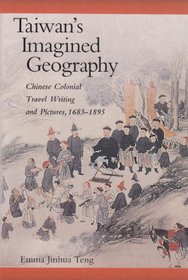Search -
Taiwan's Imagined Geography : Chinese Colonial Travel Writing and Pictures, 1683-1895 (Harvard East Asian Monographs)
Taiwan's Imagined Geography Chinese Colonial Travel Writing and Pictures 1683-1895 - Harvard East Asian Monographs
Author:
Until 300 years ago, the Chinese considered Taiwan a "land beyond the seas," a "ball of mud" inhabited by "naked and tattooed savages." The incorporation of this island into the Qing empire in the seventeenth century and its evolution into a province by the late nineteenth century involved not only a reconsideration of imperial geography but als... more »
Author:
Until 300 years ago, the Chinese considered Taiwan a "land beyond the seas," a "ball of mud" inhabited by "naked and tattooed savages." The incorporation of this island into the Qing empire in the seventeenth century and its evolution into a province by the late nineteenth century involved not only a reconsideration of imperial geography but als... more »
ISBN-13: 9780674021198
ISBN-10: 0674021193
Publication Date: 3/1/2006
Pages: 400
Rating: ?
ISBN-10: 0674021193
Publication Date: 3/1/2006
Pages: 400
Rating: ?
0 stars, based on 0 rating
Publisher: Harvard University Asia Center
Book Type: Paperback
Members Wishing: 0
Reviews: Amazon | Write a Review
Book Type: Paperback
Members Wishing: 0
Reviews: Amazon | Write a Review
Genres:
- History >> Asia >> China >> General
- History >> Asia >> Taiwan
- Travel >> Asia >> China >> General
- Travel >> Asia >> Taiwan




